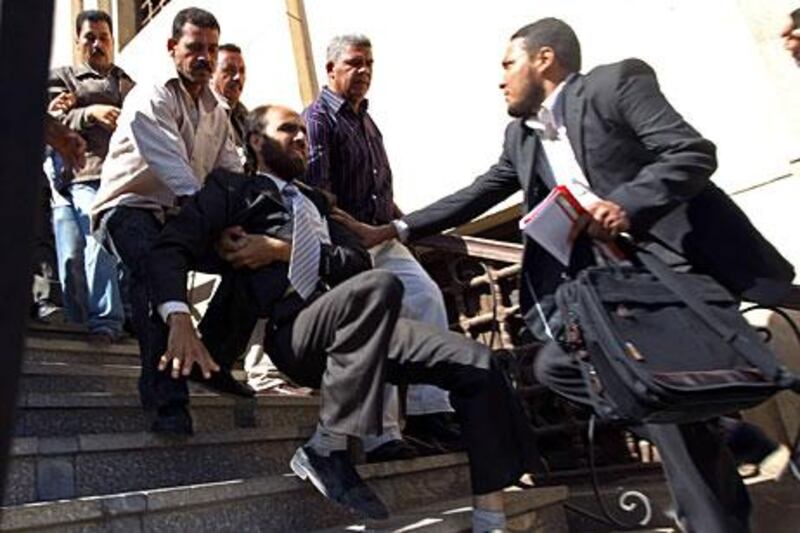CAIRO // More than 100 members of the Muslim Brotherhood, an outlawed Islamist political opposition group, have been arrested at election rallies across Egypt.
The arrests on Friday add to a growing number of Brotherhood members whom security forces have detained in the run-up to parliamentary elections on November 28. Since the Brotherhood announced it would field candidates in October, more than 800 members of the Islamist group have been arrested - many of whom have since been released - according to Abdel Moneim Abdel Maqsoud, a lawyer and activist for the group.
While the campaign of arrests is hardly surprising to Brotherhood leaders, it represents a marked departure from the ruling regime's more tolerant posture towards the illegal group ahead of the last parliamentary elections in 2005.
"This indicates that the elections are going to be rigged," Mr Abdel Maqsoud said yesterday. "In 2005, no one was arrested during the candidacy and campaign periods. The arrests in 2005 also only started in the third phase of the elections, but this year the arrests happened before the elections took place."
The first two rounds of the 2005 elections were essentially free and fair, say democracy advocates, before the government intervened to limit opposition groups in the third and final round. That rare opening of Egypt's political space allowed 88 Brotherhood candidates - all of whom ran as independents because the party is officially illegal - to sit in Egypt's 454-seat People's Assembly.
Political analysts credit the organisation's success to pressure from foreign governments, particularly the United States, that had urged Egypt to reform its political system.
Observers say Egypt's regime appears to have returned to business as usual for this year's poll: preventing opposition candidates from nominating themselves, intimidating opposition candidates and their supporters and using heavy-handed security measures at political rallies.
Helmy al Gazzar, a member of the group's deliberative Shura Council, said police used tear gas to subdue Brotherhood supporters during rallies in Mahalla Kubra, a city in the Nile Delta region, and in Alexandria on Friday. Mr al Gazzar estimated that more than 300 Brotherhood supporters were arrested this week.
Eight Muslim Brotherhood parliamentary candidates were among those who have been arrested since October. Mr Abdel Maqsoud said two Brotherhood candidates from Mansoura, another city in the delta region, were arrested on Friday. Both were still in police custody yesterday morning.
For their part, security sources told Reuters news agency that Brotherhood backers attacked police with rocks at Friday's rallies.
Mr Abdel Maqsoud said many were charged with membership in an illegal organisation or for using religious political slogans, which is a crime in Egypt.
This year's parliamentary vote comes at a critical time for Egypt's ruling National Democratic Party. Hosni Mubarak, the country's ailing 82-year-old president, may face his own election next year amid widespread speculation as to whether he will run again.
On Monday, the United States State Department urged Egypt to let foreign monitors observe election procedures. Egypt's ministry of foreign affairs called those comments "absolutely unacceptable".
Rights organisations and independent election observers say Egypt's rejection of foreign election monitors - whose presence government officials say would threaten Egypt's national sovereignty - is tantamount to an admission that the regime intends to manipulate the election results.
"Through their behaviour, the NDP and the government have allowed foreign forces and voices to request intervention," Mr al Gazzar said in an interview yesterday.
The regime amended the constitution after the 2005 elections to strip Egypt's relatively independent judiciary of its responsibility to monitor elections. Instead, the government has appointed an independent High Elections Commission to monitor polling stations alongside officially recognised civil society organisations.
In the absence of judicial supervision, said Mr al Gazzar, government meddling with election results will make it nearly impossible for the Brotherhood to mimic its past success.
"It's not that the government allowed [the Brotherhood] to get those 88 seats last time, but that there was judicial supervision of the ballot boxes," said Mr al Gazzar. "This has been changed because of the amendment."
Despite the arrests, Messrs al Gazzar and Abdel Maqsoud said their organisation would seek to free its members by appealing to judicial authorities and that campaigning would proceed as scheduled.
"The government is afraid of the power of the Muslim Brothers," Mr al Gazzar said.






